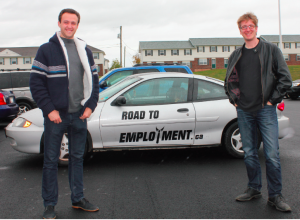Pair from Victoria fight to remove stigma from youth unemployment

Two graduates from the University of Victoria are driving across Canada looking for solutions to the youth unemployment crisis.
Clinton Nellist and Denis Luchyshyn are the founders of Road to Employment. The project aims to help youth who are having trouble finding work.
By gathering advice through meetings with young people, employers, educators and career developers, the pair are learning how students and graduates can make themselves more marketable to employers and how to better transition into the workforce.
“It’s a crazy world and you can’t really see where you’re going to be,” says Nellist.
“Many youth who enter their degree right now are entering in year one. Four years down the line the world’s going to look completely different.”
The plan is to film their stories and create a documentary.
Nellist and Luchyshyn met five years ago at the University of Victoria in their first year of school.
Nellist graduated in June of 2013 with a Bachelor of Arts degree and a specialization in political science and history. Luchyshyn graduated in December of the same year with a Bachelor of Commerce and a specialization in entrepreneurship and service management.
After being unemployed for five months, Nellist found a job in sales selling cell phones at a local mall. Luchyshyn worked for an online marketing network called Neverblue.
Neither was happy with their job, and they both saw many of their friends in similar situations. Once Nellist and Luchyshyn decided to make the film, they launched a fundraising campaign through Kickstarter, an independent website that helps people gather funds and support for their projects.
After successfully raising $5,000, the two quit their jobs and took a car across the country. Back home, Luchyshyn says many of his friends are choosing jobs unrelated to their degrees. One is working as a server for his father’s restaurant while another is working in retail. Both have bachelor’s degrees.
Luchyshyn says after spending so much time and money on a university education, young people tend to choose the first job they can find. “Lots of people feel if they don’t have an answer to what they want to do and how to achieve it, they’re the black sheep – they’re the only one.”
He says there is a lot of pressure on youth today to make a quick decision.
“How are you supposed to make up your mind on something that’s so significant? You’re going to commit four years of your life if you’re going to university … on something that you might not even be fully decided on, or you have no understanding of.”
Luchyshyn says people in this position view it as their fault. They believe they do not have enough experience or they do not possess the right skills to fit in with another organization.
Nellist wants to tell young peo- ple not to be anxious or scared about this. “Youth need to be okay with not knowing exactly where they’re going to be. That’s an okay feeling.”
He implores young people to start building a network through face-to-face conversations.
Nellist learned through experience that you can’t find work sitting behind a computer “sheltered from the world, not looking to face rejection.” He says you must go into the community, ask questions and build meaningful relationships.
The pair left Victoria on Canada Day and have visited many major Canadian cities, as well as smaller towns.
They say their biggest problem was putting housing as their lowest priority. More nights than they would like, Luchyshyn and Nellist did not have a place to stay.
They used Couchsurfing, a networking site that allows travellers to stay at other people’s homes, as their primary means of accommodation.
“Sure it was tough changing houses, sometimes four times in a given week, but you meet great people,” says Nellist.
While crossing the entire country, the pair only spent seven nights total in their car.
But their fondest memories of the trip are of engaging with local communities and meeting new people every week.
Halifax marked the last stop of their tour.
After four months on the road, Nellist and Luchyshyn capped off their cross-country campaign with Aga Khan Foundation Canada’s seminar held at Dalhousie on Oct. 22.
Entitled Youth (Un)Employment: Global Problems Meet Local Solutions, the seminar brought students and experts together to discuss how economic opportunities can be created for youth.
This is the first seminar the pair attended.
Nellist says they were invited after meeting with Greater Hali- fax Partnership, a networking program helping local and international graduates connect with business leaders in Halifax.
The seminar took an international approach, something Nellist says they didn’t “really look at too much.”
He believes in the power of local, community work but welcomes solutions from around the world.
Youth unemployment is not unique to Canada and Luchyshyn says there needs to be more com- munication to fight this global crisis.
“It’s an issue everyone’s facing … and we can work together to solve this,” he says.
The two will take their footage to Montreal. The plan is to find a space and spend the next four to six months producing their film.
Come spring, Nellist and Luchyshyn will embark on another tour – this time from east to west – to showcase their final product.
For more information, go to roadtoemployment.ca.

Recent Comments